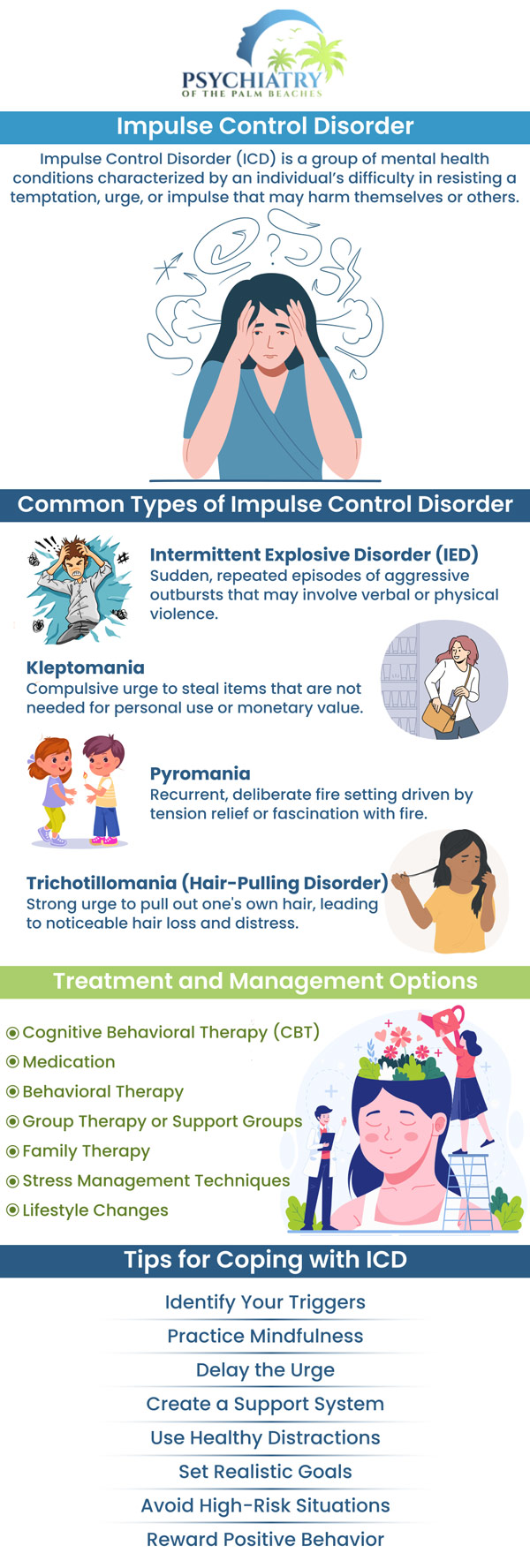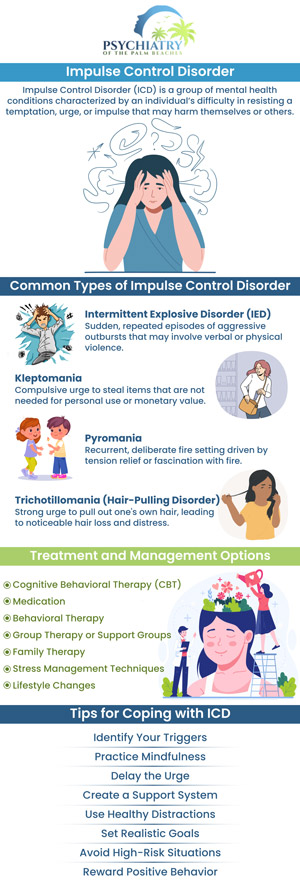Impulse Control Disorder Treatment Q&A
An impulse control disorder is a condition marked by strong, abrupt, and uncontrollable urges to act in ways that can be against social norms or the rights of others. These impulsive behaviors can occur frequently, swiftly, and without regard for the consequences of the activities. Common signs of impulse control disorder are anger, a lack of patience, difficulty concentrating, and unnecessary and intrusive thoughts. If you or a loved one is showing the symptoms of impulse control disorder, seek professional help from Psychiatry of the Palm Beaches. For more information, contact us today or book an appointment online. Visit Psychiatry of the Palm Beaches serving Jacksonville, Boynton Beach, Palm Beach Gardens, Stuart, Royal Palm Beach, Port St. Lucie, Melbourne, Fort Lauderdale, and Jupiter, FL.




Table of Contents:
What is an impulse control disorder?
What are the signs and symptoms of impulse control disorder?
How do I know if I have impulse control issues?
How is impulse control diagnosed?
Impulse control disorders are a group of behavioral conditions that cause people to be unable to control their impulses and subsequent behaviors. Impulse control disorders can cause people to have angry outbursts in public or destroy property, leading to various consequences, such as relationship strain and criminal charges. Some specific types of impulse control disorders are:
• Conduct disorder – Individuals with conduct disorder exhibit an ongoing pattern of aggression toward those around them. Children with this condition frequently violate social norms and rules at school, at home, and around peers.
• Oppositional defiant disorder (ODD) – ODD is characterized by an ongoing pattern of defiance and hostility toward those in positions of authority.
• Kleptomania – This condition is characterized by an overwhelming and often irresistible urge to steal things. Even though people with kleptomania know that stealing is wrong and there could be serious consequences, they can’t stop the urge to do it.
• Pyromania – This impulse control disorder causes people to start fires for tension and anxiety release. Though they know that this behavior can be harmful, they can’t resist the urge to start fires.
• Intermittent explosive disorder – Individuals with intermittent explosive disorder often experience outbursts due to anger. This condition can cause both the individual and those around them significant distress.
Impulse control disorders can cause a variety of behavioral symptoms, such as:
• Engaging in risky decision-making.
• Stealing from family members, friends, or stores.
• Frequent lying.
• Explosive or violent behavior.
• Extreme defiance.
• Causing property damage.
In addition, these disorders can also bring about various cognitive symptoms, including:
• Obsessions.
• Uncontrollable urges.
• Ongoing irritability or agitation.
• Difficulty concentrating.
• Intrusive thoughts.
Impulse control disorders also cause psychosocial symptoms, such as:
• Depressed or in a low mood.
• Drastic mood swings.
• Feelings of detachment from emotions, surroundings, or both.
• Social isolation.
• Low self-esteem.
• Increased anxiety.
You do not have to experience all these symptoms to have an impulse control disorder. These conditions are complex and affect people in different ways. If you notice some of these symptoms, it’s encouraged that you consult a specialist for a thorough diagnosis.
If you notice symptoms of an impulse control disorder in yourself, it’s recommended to keep track of these behaviors and schedule a consultation with a psychiatrist. If you frequently have emotional outbursts or feel constantly compelled to break the rules, there may be a behavioral disorder at the root of your compulsions.
When you visit a psychiatrist, they will discuss your health history and the behaviors you have noticed. If it is determined that you have an underlying impulse control disorder, the specialist can formally diagnose what condition is affecting you and outline the treatment options that are recommended for you. In summary, seeking professional support is the best way to stay out of trouble and manage your condition to live a less distressing and more fulfilling life.
To receive a diagnosis of an impulse control disorder, you will need to see a psychiatric specialist. The criteria used for diagnosing these behavioral conditions are outlined in the DSM-5. To establish a diagnosis, the signs and symptoms of impulse control disorders must be prevalent for a minimum period of six to twelve months.
To make a comprehensive diagnosis, psychiatrists often rely on reports from close people to the patient. This allows them to gather a more detailed understanding of all the behavioral symptoms. These reports are often collected from parents, siblings, peers, or teachers.
After a diagnosis is made, the expert creates a personalized treatment plan to support the individual in dealing with the symptoms of their disorder. Common approaches to impulse control disorder treatment include cognitive behavioral therapy (CBT) and parent management training (PMT).
Our Team’s Diagnostic Approach to Impulse Control Disorder
Identifying Impulse Control Disorder requires careful evaluation, and our team uses comprehensive assessments at Psychiatry of the Palm Beaches to pinpoint patterns of impulsivity. We help patients notice triggers, emotional states, and behavioral cycles so they can begin addressing the root causes behind their symptoms.
If you are seeking a diagnosis or treatment for impulse control disorder, the skilled professionals at Psychiatry of the Palm Beaches can help. Schedule an appointment with us and experience high-quality psychiatric care. For more information, contact us today or book an appointment online. We serve patients from Boynton Beach FL, Delray Beach FL, Palm Beach Gardens FL, Jupiter FL, Stuart FL, Palm City FL, Royal Palm Beach FL, Wellington FL, Citrus Ridge FL, Jacksonville FL, Riverside FL, Port St. Lucie FL, Beau Rivage West FL, Melbourne FL, Palm Bay FL, Fort Lauderdale FL, Hollywood FL, Jupiter FL, North Palm Beach FL, and surrounding areas.
Check Out Our 5 Star Reviews



Additional Services You May Need
▸ Mental Wellness
▸ Relationship Coaching
▸ Depression and Mood Disorders
▸ Women’s Health
▸ Panic Disorder
▸ Medications Management
▸ Men’s Health
▸ Individual Psychotherapy
▸ Bipolar
▸ ADHD
▸ Geriatric Mental Health
▸ Couple’s Counseling
▸ Obsessive Compulsive Disorder
▸ Social Phobia Treatment
▸ Eating Disorders
▸ Post Traumatic Stress Disorder
▸ Psychotic Disorders


